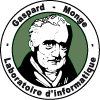Morse Sequences: A simple approach to discrete Morse theory
Résumé
In this paper, we develop the notion of a Morse sequence, which provides an alternative approach to discrete Morse theory, and which is both simple and effective. A Morse sequence on a finite simplicial complex is a sequence composed solely of two elementary operations, that is, expansions (the inverse of a collapse), and fillings (the inverse of a perforation). In a dual manner, a Morse sequence may be obtained by considering only collapses and perforations. Such a sequence is another way to represent the gradient vector field of an arbitrary discrete Morse function. To each Morse sequence, we assign a reference map and an extension map. A reference map associates a set of critical simplexes to each simplex of a given complex, and an extension map associates a set of simplexes to each critical simplex. By considering the boundary of each critical simplex, we obtain a chain complex from these maps, which corresponds precisely to the Morse complex. We show that, when restricted to homology, an extension map is the inverse of a reference map. Also we show that these two maps allow us to recover directly the isomorphism theorem between the homology of an object and the homology of its Morse complex. At last, we introduce the notion of a flow complex, which is based solely on extension maps. We prove that this notion is equivalent to the classical one based on gradient flows.
| Origine | Fichiers produits par l'(les) auteur(s) |
|---|
